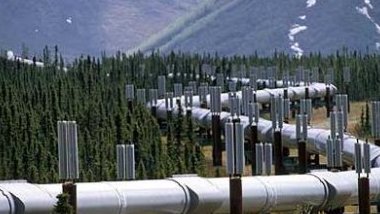On 25 June 2009 the third energy liberalization package [1] was adopted and entered into force on 3 September 2009. This new directive could be a further step towards a common European energy policy and market, especially in the quest for an EU that’s not dependent on just one resource or supplier for its energy consumption.
The aim of liberalizing the gas market is to improve competition, transparency and efficiency in the sector, establish a more durable energy policy, offer consumers a bigger choice of suppliers, integrate the different energy markets into one, improve regional solidarity and cooperation, and guarantee security of supply. This will lead to an interconnected market that’s better suited to react to both internal and external shocks in the energy market.
An example of an internal shock could be collapsing obsolete infrastructure. In a unified and open market there will be more competition and investment in new technologies and infrastructure. Therefore the incumbent huge energy companies will have to ‘unbundle’ their undertakings and make them more transparent. Ownership unbundling is the action whereby energy companies involved in the production and supply of natural gas, have to separate their different activities. In case of shortages, it will be easier for member states to buy from other markets, because the several different infrastructures will be harmonized [2] and any EU company will have the right to sell gas in any member state on equal terms with the existing national companies [3].
An external shock can be a sudden drop in supply. If supply countries want to use their energy resources as a political means, it will be far less effective in a unified market, because the purchasing countries can buy from another supplier or have other instruments at their disposal to react to an external shock. The current directive wants to install mechanisms to improve solidarity and cooperation between member states as well. Moreover, the unbundling principle also applies for non-EU corporations. The fear that the unbundling of EU energy companies would cause the acquisition of its energy networks by third countries, made the Commission introduce the so-called ‘Gazprom’-clause in the new directive. If a foreign company wants to do business in the EU it has to abide by the same rules as EU-companies. As a principle of reciprocity EU-companies must be able to acquire assets in third countries as well. That’s why the ‘Gazprom’-clause was rather controversial during the negotiations.
Earlier directives weren’t able to truly liberalize the market yet. The Commission stated that “the present rules and measures do not provide the necessary framework for achieving the objective of a well-functioning internal market” [4]. A continued lack of market transparency, competitive pressure and high levels of concentration are seen as major obstructions. [5] The ‘effective unbundling’ of production and supply remains a crucial bottleneck, however. The latest directive sets new and more rigorous guidelines on further opening the gas market. However, due to effective pressure from France and Germany, where former state monopolies as E.ON and Gaz de France still rule, an alternative for full unbundling was developed [6].
One can choose to install an independent system operator (ISO), which means that an energy company doesn’t have to break up its several activities but can place them under an independent control board [7]. This implies that the ISO is responsible for the entire management of the transmission system, which still remains the property of the company. This option wasn’t very attractive to most member states though, so a “third way” was introduced. An independent transmission operator (ITO). This option is mainly the same as the former one, except for the fact that the company still decides on investment and commercial issues. The weakness of the ISO and ITO is an increased administrative burden, because new guidelines and agencies have to be set up to monitor them, while the efficiency is less in regard to the unbundling option. This monitoring will be a task for the independent National Regulatory Authorities that need to be installed. Other responsibilities are developing cross-border transmission capacities in order to advance regional cooperation [8], and formulating action plans in case of a supply shortage.
Europe’s energy policy will have an effect on other EU domains. Therefore it must be coherent and complementary with other policy realms, so coordination will be crucial. Competition, environment and transport are just a few examples. Developing an external energy policy will be equally important to maintain good relations with foreign suppliers. Alternatives to fossil fuels and transit routes must be found as well. In the third and final part of this series, we will come back on these issues. Energy and environment are the challenges for the EU in the 21st century and have the potential to revitalise the European integration process. It could be as important as the European Coal and Steel Community once was.



Follow the comments: |
|
